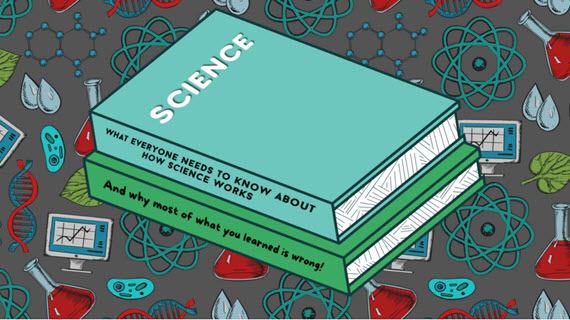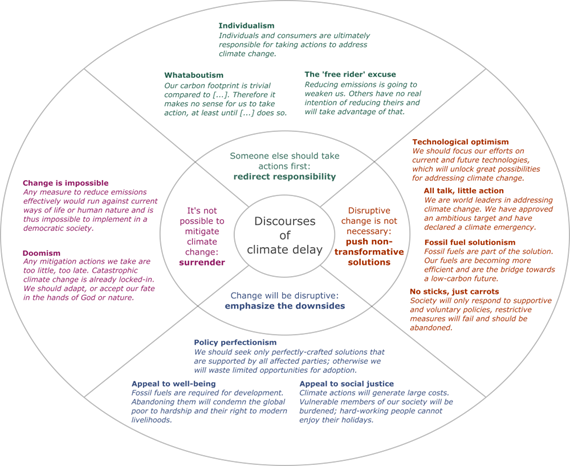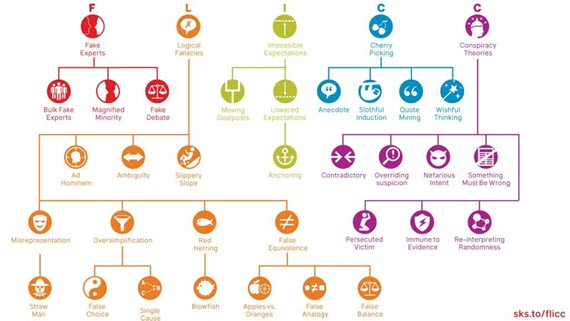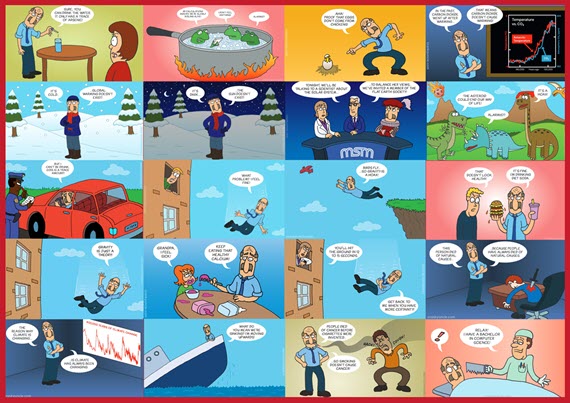Of red flags and warning signs in comments on social media
Posted on 14 June 2024 by BaerbelW
Somewhat surprisingly for what is regarded as a network of professionals, climate science misinformation is getting shared on LinkedIn, joining other channels where this is happening. Several of our recent posts published on LinkedIn have attracted the ire of various commenters who apparently are in denial about human-caused climate change. Based on their and other such comments, we compiled a list of telltale signs to be on the lookout for when reading posts or comments related to human-caused climate change or global warming on LinkedIn, other social media channels and even our own comment section. We hope you find this list helpful as the pointers can serve as warning flags to take a closer look before deciding whether to ignore or accept what has been written.
- The scientific consensus on human-caused global warming is questioned or even attacked outright, even though the basic statements that global warming is real and is mostly caused by humans due to the continued burning of fossil fuels can be called a settled fact - the facts are at least more than settled enough to base our decisions on. Legit discussions can obviously happen about what we should do. For more, please read our explainer about a scientific consensus.
Several studies have shown - depending on what you look at - that the level of agreement in the scientific literature and amongst climate scientist about the major points ranges from 91-100% - usually in the high 90s.When reading comments that provide references, readers should keep in mind that finding references from the 1-3% while ignoring the other 97-99% is a prime example of "cherry picking".
- Reactions via the „laugh“ icon on serious topics like human-caused climate change could either have happened accidentally (unlikely) or be a sign that the commenter doesn‘t quite (want to) grasp or accept scientific findings on the topic (quite likely).
- Comments making claims which seem to contradict our large list of rebuttals will in most likelihood be wrong or misleading or will not rely on scientific research published in high-quality peer-reviewed journals. If in doubt, please head over to sks.to/arguments and check for yourself.
- Comments rattling off many long-debunked myths - i.e. gish-gallops - have the sole aim to waste everybody's time and confuse people. They are best ignored.
- Comments where terms like "the science" are put in scare quotes might also be an indication that the commenter doesn‘t really know what s/he is talking about. Melanie Trecek-King's article "Science: What it is, how it works and what it means" provides a neat explanation which might be worth sharing in those cases.
- Comments making unsubstantiated absolute claims - e.g. "all models have been proven wrong…" - can be safely ignored (to see why the example is wrong: sks.to/model)
- Comments with links to blog posts or other sources may need some more checking, and if they go to blogs published by people or organizations with an entry in DeSmog's very helpful research database, caution is advised. It doesn't necessarily mean that everything written is wrong, but it nonetheless serves as a warning flag.
- Comments "just asking questions" (as defined in RationalWiki) are rarely sincere and it might be worth checking if there's a pattern of such questions in different threads by the same commenter(s).
- Sometimes a commenter's job or tagline can also give a clue. If there's a relationship to anything having to do with the fossil fuel or mining industries, whatever is being written might need to be read with a suitably large grain of salt.
- Comments may include wording typical for the "discourses of climate delay" which may contain a kernel of truth but which still serve the ultimate goal to delay taking meaningful action. These can include mentions of "fossil fuels will always be needed" or "wait until China or India do something".
- Comments including ad hominem attacks can safely be disregarded as the commenter(s) posting them have already lost the argument. It is basically just a means to change the topic from facts or science to personalities.
- Comments with hashtags like "climatescam" or "climatehoax" show conspiratorial thinking and can also be disregarded.
- Comments exhibiting any of the tell-tale techniques of science denial - "FLICC" for "fake experts", "logical fallacies", "impossible expectations", "cherry picking" and "conspiracy theories" - usually make claims which don't stand up to scrutiny but hope that you don't notice!
Want to check, how good you are spotting these techniques? Here are a few Cranky Uncle cartoons depicting some of the them. For more training, we recommend the Cranky Uncle game.
Regular SkS participants familliar with our Comments Policy will recognize that many of these red flags and warning signs are the kind of things that the Comments Policy is designed to discourage like excessive repetition, sloganeering (simple assertion of a myth already debunked), accusations of deception, ad hominems, profanity or inflammatory tone.
Did we miss any warning signs? If we did, please let us know in the comments and we may amend the list as needed.































 Arguments
Arguments



































This is an example of warning sign I've seen a few times: "Climate science and mitigation is just part of Agenda 21."
This is allegedy a plan for the United Nations to exert totalitarian control over the world and impliment evil policies. Some States in the USA (Republican states) have banned its use
In fact Agenda 21 is a set of voluntary, practical, sensible, generally commonly publically accepted guidelines to help solve a range of environmental, economic and social problems and to promote sustainable development, ideally to be worked out and implimented locally rather than by central government. This link gives a summary:
archives.studentscommission.ca/enviro/ag16to21_e.html
I find that the 'it's all a plan to enable the evil Agenda 21’ has mutated in the last couple of years into 'it's all a plan to enable the evil WEF (World Economic Forum) plan for totalitarian global control. This is usually expressed as a neo-McCarthyist fear that Johnny Foreigner is planning to take away Americans' freedoms (and guns...). They'll often refer to 'super-wealthy globalists' like George Soros and Bill Gates, Mencken's 'hobgoblins' quote and go on to quote the 'Club of Rome'
"In searching for a new enemy to unite us, we came up with the idea that pollution, the threat of global warming, water shortages, famine and the like would fit the bill. In their totality and in their interactions these phenomena do constitute a common threat with demands the solidarity of all peoples. But in designating them as the enemy, we fall into the trap about which we have already warned namely mistaking systems for causes. All these dangers are caused by human intervention and it is only through changed attitudes and behaviour that they can be overcome. The real enemy, then, is humanity itself."
"The First Global Revolution", A Report by the Council of the Club of Rome by Alexander King and Bertrand Schneider 1991"
Another favourite quote is bt Ottmar Edenhofer - "But one must say clearly that we redistribute de facto the world's wealth by climate policy. Obviously, the owners of coal and oil will not be enthusiastic about this. One has to free oneself from the illusion that international climate policy is environmental policy. This has almost nothing to do with environmental policy anymore.
Ottmar Edenhofer
'UN IPCC official'"
Just to clarify, both of those quotes have been 'quote mined' and cherry picked, by manipulative people, from much longer texts which, if read in their entirety, put a very differen meaning on the text.
I don't know why you worry about all this chatter if you know your science and conclusions are correct and infallible, that anything said in question or to the contrary is "disinformation". You've already convinced the right people of your perfection of science and purity of motive and they are going to make everybody else spend hundreds of trillions testing your theory of climate control, so stop worrying about it, in a couple decades we'll see if the 97% were right or some Copernicus or Ehrlich among the 3% hawking "disinformation" was instead.
@TWFA #4:
Just WHO is, "going to make everybody else spend hundreds of trillions testing your theory of climate control"???
TWFA @ 4:
Oh, my. What red flags does your comment trigger?
All in one short paragraph. An impressive feat, to pack so many warning signals into such a short comment. Were you intending to provide us with an example of the type of comment that is probably safe to ignore? Or maybe you're just doing a Poe? Or maybe you are just so self-unaware that you don't see this in yourself?
TWFA:
Have you noticed that there is a record heat dome over the USA today? Or that south Florida had record floods yesterday? Why would we wait 20 years to decide to take action when the climate has already dramatically changed exactly as the 97% of scientists predicted?
The longer we wait to take action the worse the damage will be.
Renewable energy is cheaper than fossil energy today and will save trillions of dollars.
TWFA @ 4
I worry about the 42% of adult Americans who either do not believe or do not know that global warming is caused by human activities (ref: Yale Climate Opinion Maps 2023. I believe that they have been influenced by persistent disinformation that continues to be initiated by the 1-3% of scientists who undermine the science. As voters, they influence political leaders and policy. Many policy makers have not been convinced that action is needed to reduce greenhouse gas emissions. See, for example, Mike Johnson Town Hall.
That global warming is caused by greenhouse gas emissions is solid, fundamental science including: 1) conservation of energy – 1st law of thermodynamics, 2) basic atmospheric physics, and 3) laws of radiant energy transfer (Stefan-Boltzmann Law, Planck Distribution Law, Kirchoff’s Law, and Beer-Lambert Law. Global warming theory is based on these fundamentals and supported by a massive amount of evidence and cross-checks. All of the disinformation that I have seen is either: 1) not supported by evidence, 2) misrepresents the global warming theory, and/or 3) does not comply with the laws of science listed above.
In addition to the justified criticisms of TWFA’s comment @4, in particular Charlie-Brown’s @8 concern regarding the significant number of people who have allowed themselves to be uninformed or misinformed, NPR recently reported “A major disinformation research team's future is uncertain after political attacks”.
The Republican Party radicalized by Fossil Fuel Interests is not the only party interested in misleading people and keeping the misled from becoming better informed. But they certainly are a major part of the problem. And, like other ‘successful’ misleaders, they mislead on many matters, not just climate science.
I recently made a related comment (see here on the SkS shared item Fossil fuels are shredding our democracy). Misleading political and economic game players are a massive threat to the future of humanity and efforts to improve democracy.
People in competition for perceptions of status and hoping to maximize ‘their freedom to enjoy believing and doing whatever they please’ can easily be tempted to misunderstand how harmful and unhelpful their misunderstanding and related unacceptable actions actually are ... including actions like absurdly believing that ‘understanding that burning fossil fuels produces significant negative climate change impacts’ can be simplistically dismissed by claiming it is the belief that ‘humans can control the climate’.
nigelj @1 is correct that the mention of 'Agenda 21' should be a red flag that the comment is presenting a misunderstanding.
The following is a link directly to UN Agenda 21. It was published in 1992.
Learning about the reality (the truth) of Agenda 21 is contrary to the developed interests of many people. The developed interests of those people are understandably a serious problem negatively impacting humanity and democracy now and into the future.
Interesting that TWFA quotes Paul Ehrlich as an example of a clever contrarian. Perhaps TWFA doesnt realise Ehrlichs predictions of mass famine by the 1970s due to over population, have clearly been proven spectacularly wrong. And it is unlikely there would be mass famine in the future, given fertility rates have fallen so much (fortunately).
Sure sometimes contrarians are proven right but putting your faith in them is very risky - especially the climate contrarians who have been debunked over and over again.
I just read the following BBC article that presents a ‘red flag’ twist on the Agenda 21 point raised by nigelj @1 and expanded on by Nick Palmer @2.
BBC News: How a Kenyan farmer became a champion of climate change denial
I have seem many comments dismissing the undeniably required rapid significant correction of developed activity and related perceptions of status by claiming that ‘Agenda 21 types of actions’ are ‘unjustified wealth redistribution from rich to poor people’ (unjustly based on the unjustified beliefs that people perceived to be richer deserve to be richer and people who are poorer deserve to be poorer).
This ‘red flag twist’ is basically that actions to correct the developed harmful ways of living ‘harm the poor’. It is often simplistically claimed that ‘putting a price on carbon’ should not be done because it hurts the poor. Of course, parallel actions to help the poor, like rebating collected carbon fees with more going to poorer people than to richer people, are required to limit the harm done to the less fortunate by the undeniably helpful action of making it more expensive to be harmful.
The following quote from the BBC reporting is the twist made by a ‘social media popular African farmer (Mr Machogu)’:
“On social media, he has repeatedly posted unfounded claims that man-made climate change is not only a “scam” or a “hoax”, but also a ploy by Western nations to “keep Africa poor”.”
So the climate change actions can be unjustifiably accused of ‘keeping the poor poor’ as well as ‘redistributing from the rich to the poor’.
Of course, anyone who cares to learn about important matters like Agenda 21 will understand the injustice of demanding restrictions on harmful actions by ‘poorer farmers’ without ‘wealth redistribution from those who are richer’ that effectively improves the lives of poorer farmers, especially the poorest, in parallel with richer people dramatically reducing how harmful their developed ways of living are (even if they believe that such harm reduction by them combined with having to help the least fortunate makes them poorer relative to the poorest).
The BBC article also includes the following statement directly related to a ‘red flag’ already identified in the OP:
““Climate change is mostly natural. A warmer climate is good for life,” Mr Machogu wrongly claimed in a tweet posted in February, along with the hashtag #ClimateScam (which he has used hundreds of times).”
OPOF:
Yes, it's amazing how so many of these zombie myths keep coming back in slightly altered form.
The OP does include a link to SkS's list of common myths (https://sks.to/arguments), and lo and behold we find "CO2 limits will hurt the poor" at #67. In that rebuttal, there is a map of Climate Demography Vulnerability Index (CDVI) that shows much of Africa as being highly vulnerable. (Go to the link above to see details on the source).
...but you also raise another important "red flag" not specifically mentioned in the OP here: logical inconsistencies in the arguments being made. It takes a significant level of psychological compartmentalization to be able to hold strongly contradicting beliefs at the same time. As you state, how can action make poor countries richer and poorer at the same time?
SkS used to have an online list of contradictory "contrarian" viewpoints, but it became too difficult for our limited number of volunteers to keep up-to-date. Too many contradictions, I suppose.
Bob Loblaw,
Thank you for the additional information.
The BBC article I referred to in my comment @12 also includes the following:
"The Intergovernmental Panel on Climate Change (IPCC) says Africa is “one of the lowest contributors to greenhouse gas emissions causing climate change”.
However, it is also “one of the most vulnerable continents” to climate change and its effects - including more intense and frequent heatwaves, prolonged droughts, and devastating floods.
Despite all this, Mr Machogu continues to insist “there is no climate crisis”."
To be fair Mr Machogu does not appear to also claim that 'climate change impact reduction actions redistribute wealth from rich to poor'. He appears to only claim that the actions keep Africans poor.
The problem is the way that contradictory beliefs seem to get gathered up into a collective of harmful misunderstandings. The contradicting claims about rich and poor both exist unchallenged in the denial gathering.
Political players with a penchant for benefiting from understandably harmful misunderstandings do not appear to care about contradictions between the misunderstandings inside their big tent, or under their large umbrella, of harmful misunderstandings. Winning any way that can be gotten away with appears to be 'Their Primary Interest'. And an essentially infinite number of 'contradictions' can be produced when evidence and reasoning do not limit the realm of what is 'believable'.
OPOF:
Your closing sentence - "...when evidence and reasoning do not limit the realm of what is 'believable'." - sums up the non-scientific aspect of the majority of the contrarian arguments.
Scientists disagree about many things. The scientific process for dealing with that is:
Principles such as parsimony or Occam's razor apply when competing explanations can explain all the current evidence equally well. The principle says that it is more reasonable to use the explanation with fewer assumptions. It's a preference, not a Golden Rule. And when additional evidence comes along that can distinguish among the various explanations, the evidence will win the argument.
OPOF:
Responding to one other point you make.
One individual may not hold those contradictory opinions (although many do), but as you say when contrarians collect their arguments from others and present them at their "conferences", publish them in their reports, or testify to Congress, they often don't care that there are contradictions. All they need to do is convince The Powers That Be that there must be a pony somewhere in that pile of [self-moderation]...